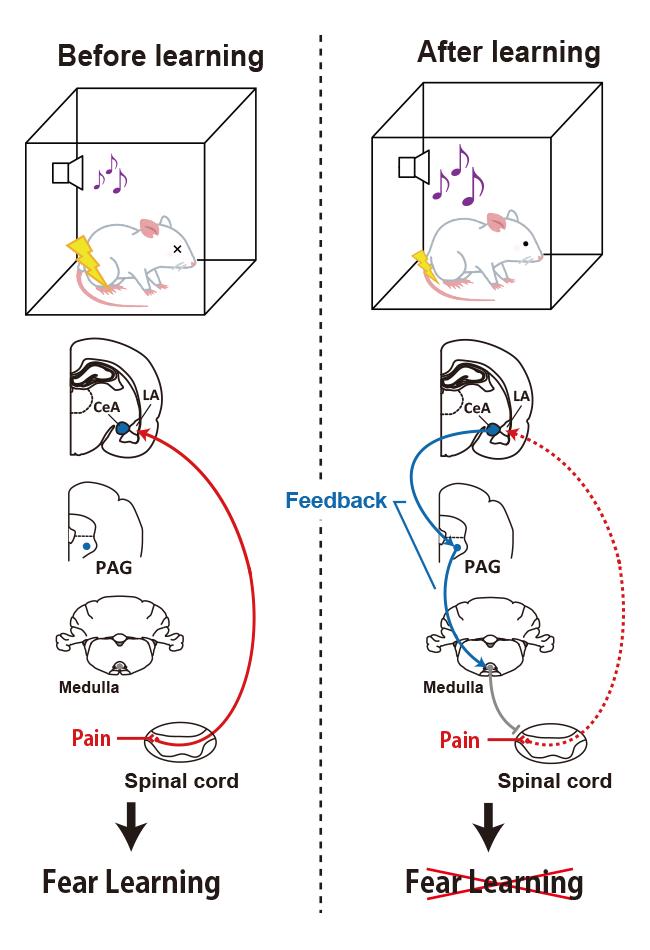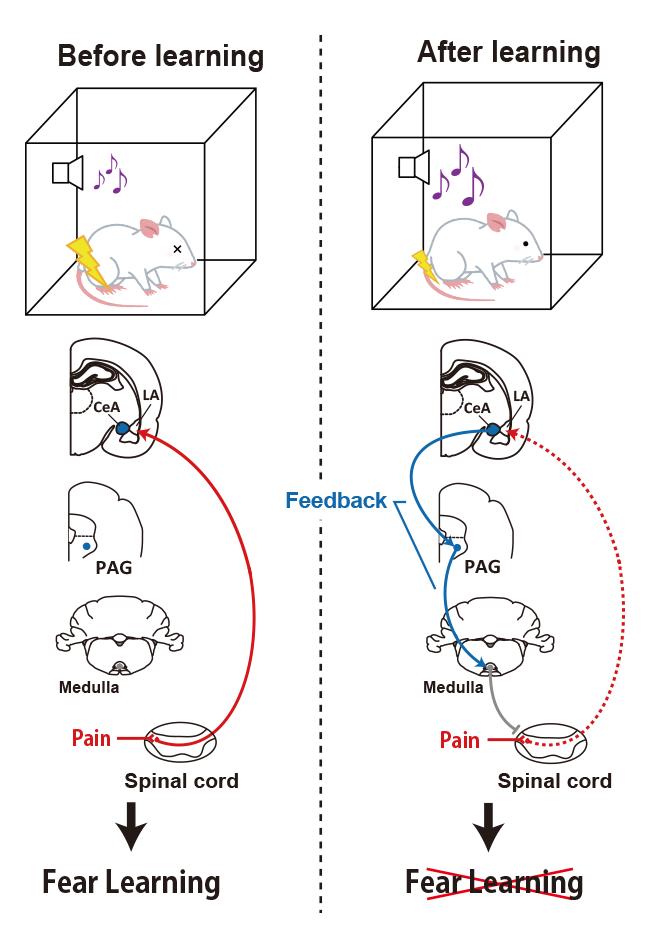
Credit: RIKEN
The creaking of an opening gate followed by a dog attack can disturb otherwise pleasant evening walks. The sound of that gate opening on subsequent walks will elicit an emotional response, and the power of this response will be different if the dog was a German shepherd or a poodle. Through repeated experiences, the neighborhood, the gate and the dog all become part of the brain's emotional memory system. The core of this system–the amygdala–forges indelible links of experience when we are attacked or threatened but, thanks to the power of expectation, the strength of these emotional memories is proportional to the unpleasantness of the experience.
"Forming an emotional memory is all about learning and calibrating our internal expectations with repeated external stimuli from the environment," says Joshua Johansen, a team leader at the RIKEN Brain Science Institute. An instructive signal like a dog attack should startle you–and your amygdala–the first time it happens, but over time, both your brain activity and your behavior will temper the reaction to the dog attack once you learn to expect when and how it happens, for example on a particular street, outside of a particular house. In a study published in Nature Neuroscience, Johansen and colleagues discovered a neural circuit that can temper the strength of emotional memories by restraining the amygdala's over-responsiveness to expected but unpleasant stimuli.
In the key experiment, rats were trained to learn the association between a mild shock and a preceding sound. The initially unexpected shocks strongly activated the lateral amygdala which, in turn, led to fearful freezing behavior in response to the sound. This freezing behavior increased with higher shock intensities, but once this association was learned, the shock-related activity in amygdala neurons diminished. "The first unpleasant experience sets off an 'instructive' signal, which is gradually turned off as the amygdala learns to use the sound to predict the shock," explains Johansen.
How neural circuits in the amygdala generate such 'predictions' to calibrate memory formation was unknown. The authors traced the origin of this modulation to a bundle of axons that leave the amygdala and flow into the PAG, a midbrain area that processes pain. There, the axons are well-positioned to dampen pain-related neural signals like shocks before they reach higher brain areas. The authors hypothesized that this circuit generates 'prediction error' signals that indicate how much an expectation differs from what actually happens, which are then used by the amygdala and other brain areas to set emotional memory strength and expectation levels.
If their idea was correct, then artificial inhibition of the amygdala-PAG circuit should interfere with normal prediction errors and expectations. Indeed, when they shut down a well-trained circuit, neurons in the lateral amygdala responded as if the shocks were being experienced for the first time. Johansen added, "By disrupting the circuit we deprive the amygdala of feedback, reset its learning level, and the shock memory becomes hyper-emotional, causing rats to freeze more."
The authors concluded that this neural circuit calibrates memory strength and helps the brain to form appropriate emotional memories. "We think that prediction-error signaling in such feedback-type neural circuits represents a general principle for brain learning systems," says Johansen. "Because the feedback originates very early in the pain pathway, the nervous system can broadcast the prediction error to many brain areas like the amygdala, where it is then used to fine-tune memories."
Understanding this circuit may also shed light on what might go wrong when feedback is absent. "PTSD (post-traumatic stress disorder) is fear learning that has compounded over numerous exposures to bad experiences, like multiple tours of combat duty," says Johansen. Such intense repeated activation of learning circuits could disturb normal prediction error signals in some individuals and make mildly aversive experiences seem much worse than they actually are. Human brain imaging studies on predicting unpleasant experiences indicate a related role for the PAG and amygdala. Johansen speculates that similar circuits that set memory strength based on prediction errors could perturb expectations in anxious people, a hypothesis deserving of further study.
###
Media Contact
Adam Phillips
[email protected]
@riken_en
http://www.riken.jp/en/
############
Story Source: Materials provided by Scienmag




